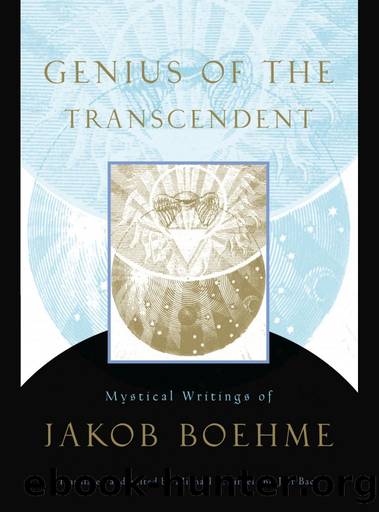Genius of the Transcendent: Mystical Writings of Jakob Boehme by Jakob Boehme

Author:Jakob Boehme [Boehme, Jakob]
Language: eng
Format: azw3
Tags: Catholic, Religion, Saints & Sainthood, Christianity, Mysticism
ISBN: 9780834822306
Publisher: Shambhala Publications
Published: 2010-05-10T22:00:00+00:00
3
TRUE YIELDEDNESS
JAKOB BOEHME composed this treatise in 1622. It was published the following year along with another short work, True Repentance. After Boehmeâs death, nine of his short works were gathered and published under the title The Way to Christ, and True Yieldedness was among them.
The word Gelassenheit in the title, here rendered as âyieldedness,â has a long history as a bedrock term in the German mystical tradition, and contains numerous layers of meaning. Among them are concepts of submission, resignation, relinquishing oneâs own will, and releasing. To use the phrase of contemporary twelve-step programs, Gelassenheit means âLet go and let God.â The word also carries overtones of tranquillity, serenity, and equanimity.
The fourteenth-century Dominican mystic Johannes Tauler, who was widely read among Boehmeâs contemporaries, describes Gelassenheit in his second sermon on Pentecost. For Tauler, Gelassenheit entails leaving behind everything, even oneâs hope of enjoying the presence of God, in order to conform oneâs will to the will of God:
A person is completely stripped of oneâs self in complete and genuine resignation to God. One sinks deeply into the ground of the divine will, to linger in this poverty and nakedness, not for a week or a month, but rather, if God wills, for a thousand years or a full eternity. Or if God were to wish to have one forever in hellfire, in eternal pain, so that one could thoroughly yield oneself therein, children, that would be true Gelassenheit . . . with this Gelassenheit one sets oneâs foot truly into eternal life, and after this pain one never again comes into another, neither into hell nor into any other suffering, and it is impossible that God would ever forsake this person.1
This mystical tradition of utter abandonment to the will of God underpins Boehmeâs thoughts on Gelassenheit.
For Jakob Boehme, a fundamental problem for human beings is possessiveness. Possessiveness manifests the human desire to dominate and to control more than is really in our power, and more than God has put at our disposal. Domination leads us into the world of wrath rather than the world of love. It brings strife and conflict, as Boehme saw so clearly in the Thirty Yearsâ War that raged around him. The lust for dominion expresses itself in arrogance. Most people are not princes fighting over earthly territory, but we are all tempted by arrogance inwardly, through our misuse of reason and knowledge. Both reason and knowledge are great gifts from God, but they are to be held lightly, not possessively.
As Boehme sees it, you are what you eatâand you eat what you are. Godâs intent for humankind was to eat of the fruit of paradise in that primordial state of harmony and balance that prevailed before the Fall, when good and evil were revealed. Adam and Eve, however, rebelled and chose instead âto eat from the characteristic of the self, that is, from the dominion of life in which good and evil stand.â Motivated by selfish desire, they departed from yieldedness. According to Boehme, humans (and angels) have great powers of self-determination.
Download
This site does not store any files on its server. We only index and link to content provided by other sites. Please contact the content providers to delete copyright contents if any and email us, we'll remove relevant links or contents immediately.
The Four Agreements by Don Miguel Ruiz(5501)
Breaking Free by Rachel Jeffs(3618)
The Hatha Yoga Pradipika (Translated) by Svatmarama(2476)
120 Days of Sodom by Marquis de Sade(2426)
Member of the Family by Dianne Lake(2014)
The Tao of Physics by Fritjof Capra(1841)
The Psychedelic Gospels: The Secret History of Hallucinogens in Christianity by Jerry B. Brown(1823)
The Road to Jonestown by Jeff Guinn(1740)
Uriel's Machine by Christopher Knight(1618)
Going Clear by Lawrence Wright(1566)
Going Clear: Scientology, Hollywood, and the Prison of Belief by Lawrence Wright(1566)
The Grand Grimoire: The Red Dragon by Author Unknown(1411)
The Gnostic Gospel of St. Thomas by Tau Malachi(1406)
Key to the Sacred Pattern: The Untold Story of Rennes-le-Chateau by Henry Lincoln(1348)
The Malloreon: Book 02 - King of the Murgos by David Eddings(1302)
Waco by David Thibodeau & Leon Whiteson & Aviva Layton(1290)
The New World Order Book by Nick Redfern(1251)
The Secret of the Temple by John Michael Greer(1213)
The Initiatory Path in Fairy Tales by Bernard Roger(1174)
